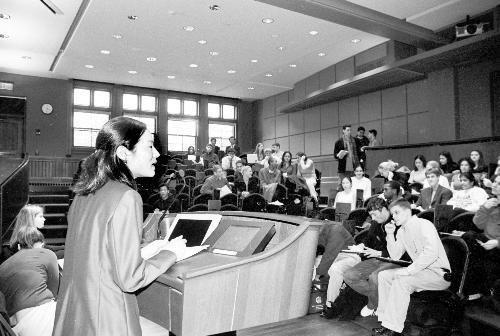
Undergraduate Council President SUJEAN S. LEE ’03 leads a meeting in Sever Hall, where the council holds its weekly meetings. The leaders of the council are elected by the entire student body.
Every one of Harvard College’s 200 extracurricular activities has a leader.
Extracurriculars provide opportunities for students to pursue their ambitions and reach the tops of organizational ladders. But these ascents take many different forms precisely because the hierarchies being climbed are so varied.
Even the hundreds of organizations that receive funds from the College’s Undergraduate Council and are subject to the College’s oversight have few formal restrictions upon who may vie for leadership posts.
According to the Faculty of Arts and Sciences Student Handbook, “All officers and a majority of the members” of an organization “must be registered undergraduates.” Organizations’ heads must also keep track of finances, and those students on academic probation “must attend all classes and be especially conscientious about all academic responsibilities.”
Aside from these regulations and the prohibition of discrimination “on the basis of race, creed, color, sex, sexual orientation, or physical disability,” College-funded organizations enjoy almost complete autonomy in their selection processes.
With so much leeway, procedures for choosing leaders vary widely among these organizations—ranging from the purely democratic to the exclusive.
And College groups that are financially independent from Harvard add even more variability to the mix.
The campus-wide voting for the president and vice president of the Undergraduate Council sharply contrasts with the cryptic rituals of the Harvard Lampoon, a semi-secret Sorrento Square social organization which used to occasionally publish a so-called humor magazine.
But the gamut of selection processes for the heads of extracurricular groups ultimately serves as an indicator of a group’s perceived internal harmony. The more democratic a group’s election procedures are, the more likely it is for its controversies to become public knowledge.
Democracy’s Discontent
Winston Churchill once noted that “democracy is the worst form of government, except all those other forms that have been tried from time-to-time.”
At Harvard, organizations with democratically elected leadership have had their fair share of travails in recent years.
The Undergraduate Council, the Harvard College Democrats and the Harvard Republican Club (HRC)—all political organizations that choose their leaders through democratic voting systems—have each suffered from recent electoral controversies.
In early 2000, council Vice President John A. Burton ’01 was impeached for his alleged theft of over 100 pin-on buttons from the Bisexual, Gay, Lesbian, Transgender and Supporters’ Alliance office for use in his campaign with his running mate, council President Fentrice D. Driskell ’01.
Although Burton survived the impeachment, the imbroglio severely weakened Driskell’s administration.
Read more in News
Top Israeli Official Talks Policy












